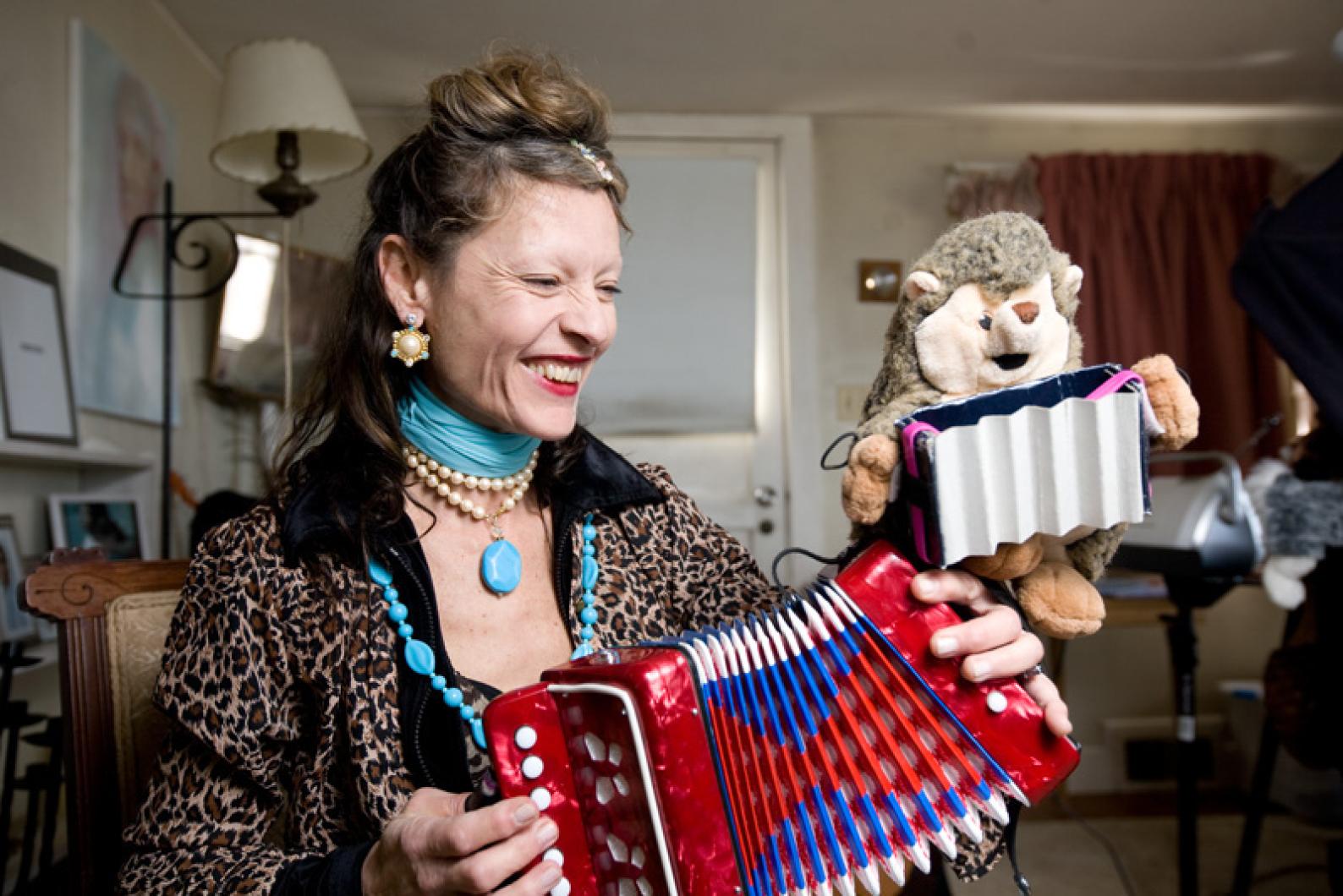In his 1841 essay Circles, the transcendentalist philosopher Ralph Waldo Emerson celebrated the moment when a visionary rises up amongst us. “By a flash of his eye,” wrote Emerson, the artist “burns up the veil which shrouded all things, and the meaning of the very furniture, of cup and saucer, of chair and clock and tester, is manifest.”
Anyone who has seen Bella perform, whether on stage, in the street or in a café, has had the opportunity to watch this radical unveiling of cup and saucer, chair and clock, take place. A skilled, serious and spontaneous artist, Bella (like Madonna, she discarded her patronymic at the same time she declared herself an artist) is a woman for whom the wall between art and life is permeable if not nonexistent.
When she is performing, whether it is a dance, a song or a puppet show, she herself looks surprised. It as though, rather than trying to paint an illusion, she is sharing with you something that is instantaneously being revealed to her, to her own great amusement and delight. “I believe what I am saying,” she explains.
Her philosophy, with its insistence on the preeminence of the immediate moment, its latent pantheism, and its intimation of the imminence of the divine, puts her very much in line with Emerson and the transcendentalists. Her presentation is different indeed. A host of fuzzy puppets, a family of stringed instruments, and a dazzling costume chest stand in for expository prose, but the message comes through loud and clear.
In her current performance, a puppet show called The Hole Without a Bottom, the character Armadillo tries to dig his way to the bottom of a hole. As the other animals look on in concern, the young children in the audience at Che’s Lounge in Vineyard Haven laugh hysterically to the host of funny sound effects employed by Bella to reproduce the sound of Armadillo’s digging.
The older audience members are free to view his long, bootless dig as painful existential querying, but the children do not have to be burdened by any kind of interpretive work if they do not choose it. Her performances are aimed at everyone, though she feels that children are often her best audiences: “The kids, they accept me. They know I am there.” She feels, in turn, a special responsibility towards them, and believes it is important to make sure our children are “always awake. If not — trouble,” she says.
Bella performs The Hole Without a Bottom both in English and in Portuguese, her first language, and in fact the play is based on a story written by Island resident Lynn Weber, whom she met in a Portuguese language class. A native of Brazil, Bella considers herself a kind of emissary from the Brazilian community. At a performance of samba and bossa nova music at the West Tisbury Library this past Saturday, she struck the pose of not only performer but educator, touching on some of the niceties of the Brazilian musical tradition.
Bella’s efforts to expound her point of view tend to hover near and settle often on a single word: simple. “Simple” has an elastic and potent significance in her usage. “Simple things, everyone can feel these things. Simple means real,” she says.
“I enjoy the present very much,” she says. “I am a simple woman.”
Staying rooted in the present has a lot to do with the concept, as does acceptance. “How to choose things how they are, not how you want them to be for us, I think can be simplicity.”
For Bella, there is a kind of ethical imperative to stay inspired, and to attempt to see things in their wholeness. “Like today,” she says, gesturing to the grey, rainy scene outside the window. “Today is completely different from yesterday. This contrast is everywhere.” Rather than try to transform things, she aspires to see them as they are. “Let life bring you things,” she says. “Suffering is a part of life.” The trick, she adds, is to try to “understand the movement of things, your movements.”
Bella believes that physical and emotional strength are linked. “One feeds on the other,” she says. “I like to sing, dance, be on. This means energy.” For her, this personal upkeep is not purely personal. It is a dedication to her life and art that matters because, she explains, “I feel like it can be good for somebody else.”
As far as money is concerned, she has a simple solution regarding that too. “Money is good for this world, but these things [she gestures towards her puppets, her paintings, her ceramics] come from another world.
“I’m not a philosopher, but I like to think what’s going on, or to feel that’s going on,” she says. “We have to use better” she says, pointing at her head. “There is no fears. If there is fears, keep going. I feel good, natural, sure about these things.”







Comments
Comment policy »